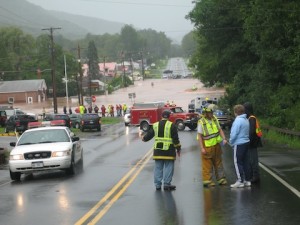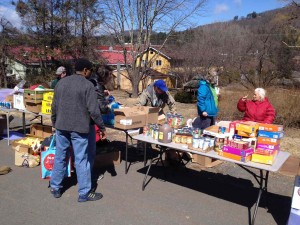Summertime
“What’s happened?” she asked with concern in her voice.
“What do you mean? ” I replied.
“What happened to the people?”
“Oh, that. Well, it’s summer.”
What’s happened is that the faces are often different in the pantry in the summer. When you’re living on the edge, when you’re a member of the Struggling Class, the change of seasons counts for a lot.
People who were too sick to make it to the pantry in cold are now able to make it out. How they manage to make it through the winter is a question for me. These shoppers barely get enough to eat as it is. How do they eat over the winter? Humans are not bears and don’t hibernate. What do these disabled do to survive?
And, yet, we have many in this category.
Some can’t make it to the pantry in the winter because their vehicles aren’t winter worthy. Beyond a certain temperature, the cars just don’t work. Then, as spring rolls around, they manage to get them running again to drive to the pantry during the warmer months.
Making it to the pantry in the winter is really difficult for the homeless. Truthfully, I don’t know how some of these homeless live in the winter. How they keep from freezing to death seems to me to be a miracle.
We lose some shoppers also. In the winter, men visit the pantry regularly because they don’t have work. Then, as the weather gets warmer, they find jobs and can’t come to the pantry because they’re working when the pantry is open.
We always miss these guys because they are good volunteers and really make a contribution to the pantry during the cold months.
One staple which carries everyone through challenges is peanut butter. Peanut butter is important to everyone in the Struggling Class.
It is important because it:
can be eaten right out of the jar.
needs no refrigeration.
has a long shelf life.
is not necessary to have teeth in order to eat it.
does not have to be combined with another food in order to be palatable.
is nutritious.
does not usually come in a container requiring a can opener.
is not necessary to cook it.
The only hitch to this whole wonderful story about peanut butter is that most of the time, there is no peanut butter in the food pantry.
The only time we are able to get peanut butter in our pantry is when we are having a peanut butter drive. It’s been months since we’ve had a decent amount, or any amount, of peanut butter.
Can you help?
There are 2 ways you can come to our rescue:
Our pantry is open Mondays from 2 to 4 in the afternoon. I’m usually there by 10:00 am.
On Tuesday mornings from 9:00 to 10:00 we are in the pantry packing the take out bags.
If you live/work in the area and want to bring some peanut butter to the pantry, we’re happy to receive it then.
If dropping the peanut butter off at the pantry is not convenient, we’ll be happy to accept your donation and purchase the peanut butter for the pantry. Please send the check to: Reservoir Food Pantry, P.O.Box 245, Boiceville, NY 12412.
We thank you in advance for this generosity. Currently, we serve over 150 households each week. Everyone needs peanut butter.
Peace and food for all.
Thurman Greco
Thank you for reading this blog post.
Please share this article with your preferred social media network.
Don’t forget to join the email list.
Grocery shopping is always a problem for the elderly.
I first met her outside the shed at the Reservoir Food Pantry. A recent widow, I heard her comment “I just never knew how hard it was going to be as a widow.” Her husband died just over a year ago and she’s still making her way toward accepting her new reality.
“I never knew it would be so difficult…being alone like this. I’ll never tell my children I come here. I don’t want them to know.”
As she spoke, she wiped an occasional tear while moving through the pantry line with a group of women, all about her own age. They were choosing corn and apples, squashes, greens, onions, potatoes. As the line snaked forward, she turned her attention to the canned goods: beans, soup, fruits, veggies.
Pat hasn’t made it to the food stamp office in Kingston. For one thing, it’s a good half hour down Route 28. For another, she’s afraid:
of the forms,
the humiliation of being unable to survive on her own,
the long wait in a building she may not even be able to find,
finally, she’s afraid of the whole process which she finds frightening.
Her financial situation isn’t so far from all the other older women in the pantry line. Grocery shopping for the elderly is difficult under the best of circumstances. Getting to the grocery store can be challenging for older people – getting around in the parking lot and going up and down the grocery store aisles is no fun anymore. And, then, when they can’t find what they need, they have to maneuver the muddy parking area and the scary entrance ramp at the pantry. And…we haven’t even discussed the packages yet. They’ve got to be gotten home and in the house (wherever and whatever that is).
Finally, getting high quality, affordable food is more and more difficult as the days go by. And, as difficult as it is for Pat, she’s one of the lucky ones. She’s got a working automobile.
Combine the lack of a working automobile, bad weather, not enough $$$ and you’ve got the makings of a disaster for a senior.
I keep telling everyone who’ll listen that seniors should get their SNAP card, a list of nearby pantries, and their first social security check at the same time. So far, nobody has listened. Of course not. Why should they? We’ve all got gray hair.
Seniors struggle with the big 3:
food
housing
medical expenses.
Forget the extras like clothing. As seniors, we get less, pay more, and go without. When I need something new to wear, I go to the boutique of my closet.
Healthcare costs can be devastating, even to a senior with medicare. Once a person comes down with cancer or other expensive disease, the pocketbook empties pretty fast.
There is real pressure to feed the rising tide of hungry people at every pantry. We get questionnaires periodically from different agencies wanting to know how often we run out of food. How does “weekly” sound?
The Big 3 for pantries include:
high unemployment
widespread poverty
deep cuts in social spending programs.
Pantries, for the most part, are
arbitrary,
subjective,
strongly biased
when it comes to deciding who can and cannot receive food. There are simply too many agencies with too many people standing in line for too little food for any food bank or state office to properly oversee and supervise the selection process.
As far as feeding the hungry, we’re not even coming close to filling the need created by the widespread poverty and deep spending cuts. People in food pantry lines are, in a severe winter, choosing between eating and heating.
Our pantry, housed in a shed, an old green house, and the back of a restaurant is a ragtag emergency food movement which is in reality not emergency at all.
Lines and crowds outside our pantry on Monday afternoons can easily convince any onlooker that the good old U S of A has a food problem.
http://www.reservoirfoodpantry.org
Thank you for reading this blog/book.
Please send a comment.
Please share this article with your preferred social media network.
Don’t forget to join the email list.
Peace and food for all.
Thurman
Tara Sanders Teaches Trauma Sensitive Yoga
Many people coming to a pantry or soup kitchen have given up on their stories. They’ve lost their voices. With trauma-sensitive yoga classes, they have an opportunity to change the stories themselves. They can add new chapters.
Tara Sanders, a Woodstock based yoga instructor, is the program director in the nonprofit Exhale to Inhale.
Exhale to Inhale yoga works to empower survivors of domestic violence and sexual assault to heal through yoga. Exhale to Inhale yoga guides women through postures, breathing, and meditation. Taught in trauma-sensitive style, practitioners are enabled to ground themselves in
their bodies
their strength
their stillness.
As this happens, they connect to themselves and work toward empowerment and worthiness. This practice can be transformational for survivors of sexual abuse and domestic violence when they shed the cloak of victimhood.
This is extremely important for people working and shopping in pantries because many survivors of domestic and sexual violence are found in these communities. The influence of this trauma is great. Add to this trauma another layer of
hunger,
unemployment,
underemployment,
homelessness,
serious illnesses to include mental illness
and you have a person who is finally voiceless.
Finally, the classes are free. Many attending these classes have absolutely no money at all.
Healers and body workers have long known that when the body is traumatized, the event is stored in the muscles.
Tara teaches the classes without music. She does not touch the students to correct a posture. Lights remain on throughout the class. These sessions offer survivors an opportunity to reclaim their lives through the healing and grounding of yoga.
Tara uses the yoga classes to help her students feel safe, strong, and in the present moment. As she teaches, she is a conduit for healing, and healthful programs in our community.
Exhale to Inhale is a New York-based nonprofit offering free weekly yoga classes to survivors of domestic and sexual assault. As an introduction to our area, Tara will teach free public yoga classes on Saturdays from 11 am to noon at the Center for Creative Education, 15 Railroad Ave, in Kingston.
After June 20, Exhale to Inhale yoga will be offered free of charge to women in area shelters.
Thanks for reading this blog.
Please send a comment.
Please refer this article to your preferred social media network.
Don’t forget to join the email list.
Thurman Greco
Why I work in a pantry…even after all these years.

“This is perfect weather for a flood” she said casually. “It’s good to see the county out cleaning the ditches by the roads. We need to be ready.”
As I write this post, my mind travels back in time to the 1st pantry day after both Hurricane Irene and Super Storm Sandy. I managed a pantry in Woodstock, NY then. What pantry days they were! People came in looking for anything and everything they could find. They were upset, scared, coping with loss. Many had lost everything – car, house, job. They didn’t know where to turn.
Sadly, neither did I. As they filed in the pantry room, they asked questions that I couldn’t answer. So…I referred them to Family of Woodstock down the street. I simply didn’t know what else to do.
So, now I fast forward to the present where I manage a pantry in Boiceville, NY. Residents here are still recovering from Irene and Sandy. At this pantry, I see some of the same people I saw in Woodstock. Recovery is slow.
Reservoir Food Pantry volunteers work to assure that quality food is available for the many individuals and families in Ulster County. They struggle with food insecurity, homelessness, and underemployment. About 40% of our clients are transportation challenged and we deliver food to them.
Hunger comes in several categories in our area:
elderly poor
employed poor
ill poor
infant poor
generational poor
persistent poor
resource poor
situational poor
struggling poor
Regularly, without even a second thought, volunteers at our pantry located in the Ashokan Reservoir area of Upstate New York, work hand-in-glove with UlsterCorp volunteers, Rondout Valley Growers’ Association. Together, they make an an ongoing effort to provide enough food for those struggling daily with hunger.
Now, in 2015, area pantries are working to be a cohesive group with food storage and safety procedures known by everyone. We know, even if no one else does, how much the area hungry and homeless need the food. Hunger alleviation cannot be effectively carried out in a vacuum.
Our success depends on long term commitment and collaboration. We need to be able to escalate services when needed. Volunteers in our group are here for the time and effort necessary to fight hunger and homelessness in our area.
www.ulstercorps.org
www.familyofwoodstockinc.org
www.goodmorningwoodstock.com
Thank you for reading this blog.
Please refer this article to your preferred social media network.
I hope you found this helpful. Please leave your comments below and check out our other posts.
Don’t forget to join the email list.
Peace and food for all.
Thurman Greco
The Big 3: We get less, pay more, and do without.
WHAT GROCERIES CAN YOU BUY FOR $16?
(The Minium SNAP Allotment)
Prices from Kingston Walmart
– 1 dozen eggs – $1.98
– 1/2 gallon milk – $1.94
– 1 lb. pinto beans – $1.28
– 1 lb. rice – $ .84
– 1 lb. onions – $ .99
– 1 can diced tomatoes – $ .79
– 1 lb ground turkey – $2.98
– 1 can corn – $ .77
– 1 lb. potatoes – $2.97
– 1 can tuna – $ .78
Total = $15.32
I first met Pat last fall when she came to the Reservoir Food Pantry the first time. She’s an older woman, a widow. Her husband died just over a year ago She’s still making her way toward her new life.
“I never dreamed it would be so hard…being alone like this. I didn’t tell my children that I came here. I don’t want them to know the situation.”
While she spoke, she wiped an occasional tear. She moved through the pantry line composed of a group of women, all about her own age. They chose corn, apples, squash, late season greens, onions, potatoes. As the line snaked forward, she turned her attention to the canned goods: beans, soup, fruits, veggies.
Pat hasn’t visited the SNAP (food stamp) office in Kingston yet. For one thing, it’s a good half hour down Route 28. For another, she’s afraid:
the forms,
the humiliation of being unable to survive on her own,
the long wait in a building that she may not even be able to find. And, finally, she’s afraid of the whole process which she finds threatening.
Her financial situation isn’t so far from all the other women in the pantry line. Grocery shopping for the elderly is difficult under the best circumstances. Getting to the grocery store can be challenging for order people – getting around in the parking lot and going up and down the grocery store aisles is no fun anymore. Then, when they can’t find what they need at a price they can afford, they have to maneuver the muddy parking lot and the scary entrance ramp at our pantry.
We haven’t even discussed the packages yet. They’ve got to be gotten home and in the house wherever and whatever that is.
Finally, finding affordable high quality food becomes more difficult as the days go by. As difficult as it is for Pat, she’s one of the lucky ones. Her automobile works.
The combination of a nonworking automobile, bad weather, insufficient $$$ is the makings of a disaster for a senior.
I keep telling everyone who will listen that seniors should get their SNAP card, a list of nearby pantries, and their Medicare card at the same time. So far, nobody has heard.
“Of course not.” I tell myself. “Why should they? We’ve all got gray hair.”
Seniors struggle with the Big 3:
food
housing
medical expenses.
Forget the frills like Kleenex and clothes. As seniors, we get less, pay more, and go without. We decide whether to heat or eat.
Healthcare costs can be devastating, even to a senior on medicare. Once a person comes down with cancer or other major disease, the pocketbook empties pretty fast.
There is a real pressure to feed the rising tide of hungry at every pantry. We receive questionnaires periodically from different agencies wanting to know how often we run out of food. How does “weekly” sound?
The Big 3 for pantries include:
high unemployment,
widespread hunger
deep cuts in social spending programs.
Every pantry is different. Some feed anyone who needs food.
Others are arbitrary and biased when it comes to deciding who can or cannot receive food.
Yet others require paper work which cuts eliminates the homeless entirely.
There are too many agencies with too many people standing in line for too little food. No Food Bank office can oversee or supervise the selection process.
At Reservoir Food Pantry, we serve a 3-day-supply of food with a large dash of dignity to all who come.
The lines and crowds outside pantries can easily convince any onlookers that our nation has a food problem.
Thank you for reading this blog/book.
Please share this article with your preferred social media network.
I hope you found this article helpful. Please leave your comments below and check out our other posts.
Don’t forget to join the email list.
Peace and food for all.
Thurman Greco










